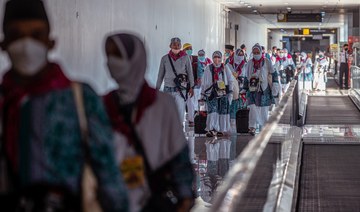JAKARTA: Indonesia wants to attract Saudi travelers with its natural and cultural wonders beyond the holiday island of Bali, the Asian nation’s tourism minister has told Arab News, as the country’s post-pandemic strategy is focused on quality and sustainability.
Indonesia is targeting to welcome 8.5 million foreign visitors in 2023 as it is rebounding from the COVID-19 lull that brought its key forex-generating hospitality sector to a standstill.
While the figure is still about a half of the arrivals recorded in 2019 — right before the coronavirus outbreak — the country’s tourism is oriented toward long-term visits and travelers who contribute more to the local economy.
“We are focusing on quality and sustainable post-pandemic tourism, where we expect tourists to stay longer and have much bigger spending,” Tourism and Creative Economy Minister Sandiaga Uno said in an interview with Arab News on Thursday.
The Tourism Ministry’s data shows these goals match the travel patterns of visitors from Saudi Arabia.
“We’re seeing travelers from Middle East regions focusing more on personalized, customized, localized (travel),” Uno said, adding that they also look for “hidden gems in new destinations.”
Most tourists, also from Arab countries, opt for the world-famous Bali.
In 2019, out of the 16.1 million who came to Indonesia, 40 percent had gone to the island which that year accounted also for over a third of Indonesia’s foreign exchange obtained from tourism.
But the country has much more to offer both in terms of culture as well as nature and wildlife. Some of the attractions across the tropical archipelago have been promoted as alternatives to Bali and to make tourism revenues less dependent on the resort island.
These “super priority tourist destinations” include Borobudur — the world’s largest Buddhist temple, dating from the 8th and 9th centuries and located in central Java — and Labuan Bajo, a port in the island of Flores, which is the gateway to the small islands that are home to the famous Komodo dragons.
There is also Mandalika on the island of Lombok, east of Bali, and Likupang village on the easternmost tip of the Sulawesi island, which are famous for sandy beaches, reefs, diving and surfing spots.
“We believe that these beautiful beaches and bays, panoramic views, green mountains, clear rivers and sports tourism would be preferred by Middle Eastern (travelers),” Uno said.
“We really would like to offer this to tourists from the Middle East, in particular Saudi Arabia.”
The Kingdom is one of the 20 main markets of Indonesia’s tourism sector, which hopes to attract at least 60,000 Saudi visitors this year.
The target is less than half of the 2019 figure, when 157,000 Saudis visited the country and, according to the minister, is very low compared with the potential.
“We’re aligning promotions, we think that there’s a captive market for us,” he said.
To capture the Saudi market, Indonesia is engaging influencers and participating in international tourism trade shows such as the Arabian Travel Market and the Riyadh Travel Fair.
It is also ramping up connectivity and the minister added that talks were underway with Saudi flag carrier Saudia to increase the number of direct flights between the two countries.
Meanwhile, he was hopeful to see new visitors soon as Saudi Arabia’s long summer holiday season will begin next month.
“The summertime in Saudi and the Middle East would be the best time to visit,” Uno said. “See you soon in wonderful Indonesia.”














